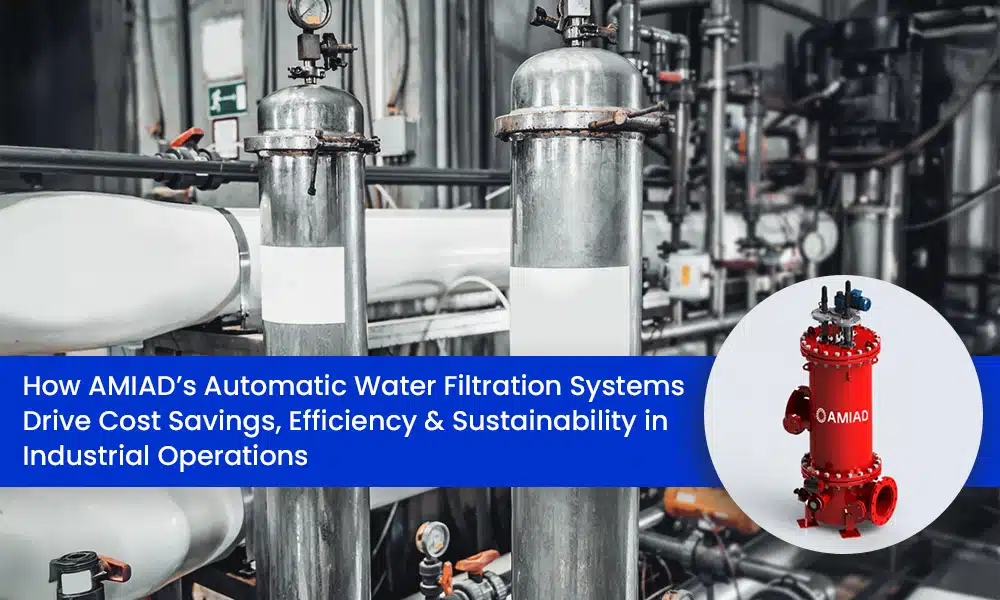How AMIAD’s Automatic Water Filtration Systems Drive Cost Savings, Efficiency & Sustainability in Industrial Operations

The Industrial Filtration Imperative
In today’s high-stakes industrial environments, operational efficiency and sustainability are no longer optional, they’re business imperatives. Facilities across manufacturing, food and beverage processing, and municipal infrastructure must juggle competing priorities: reduce costs, minimize downtime, meet tightening compliance standards, and support environmental goals. One overlooked yet powerful solution sits at the heart of these challenges: water filtration.
AMIAD’s automatic self-cleaning filtration systems, distributed and supported across Canada by Pelmar Engineering Ltd., offers a transformative alternative to traditional manual and semi-automatic filters. With proven results across sectors, these systems empower operations to streamline maintenance, improve uptime, and align with green initiatives, without sacrificing performance.
Everything You Need to Know About AMIAD Filters: Expert Answers for Industrial Operators
What are the cost savings of using AMIAD’s automatic water filtration systems?
AMIAD’s automatic water filtration systems reduce operating expenses by eliminating the need for frequent manual maintenance, minimizing downtime, and extending equipment lifespan. Facilities using AMIAD systems often report labor savings of 30–50%, reduced replacement part costs, and fewer emergency repairs. These systems also help optimize energy usage by maintaining clean flow paths, reducing pump stress, and improving system efficiency. For facilities calculating long-term ROI, AMIAD filters typically pay for themselves within 12 to 24 months.
How do self-cleaning filtration systems work in industrial applications?
Self-cleaning filtration systems like AMIAD’s operate by continuously monitoring differential pressure across the filter. When buildup reaches a preset threshold, the system triggers a cleaning cycle, often within seconds that uses internal suction scanners or backflushing to dislodge debris. This process occurs without interrupting flow, ensuring continuous operation. These systems are particularly effective in industrial settings where filtration must be consistent, such as in cooling water, process water treatment, or wastewater recycling.
What industries benefit most from automatic water filtration systems?
Industries that require uninterrupted operations and handle large water volumes benefit the most from automatic water filtration. This includes manufacturing (e.g., automotive, metal processing), food and beverage (where hygiene and compliance are essential), municipal water treatment, pharmaceuticals, and agriculture. In these sectors, filtration-related downtime or contamination risks can lead to significant financial and reputational damage. AMIAD’s self-cleaning systems help maintain operational continuity while meeting stringent industry standards.
How do AMIAD filters help meet environmental compliance standards?
AMIAD filters support compliance with environmental and safety regulations by reducing water waste, lowering energy use, and enabling cleaner effluent output. Their efficient design aligns with standards such as NSF/ANSI 61 (for potable water), CFIA and FDA compliance in food-grade applications, and ISO 14001 for environmental management systems. By ensuring consistent water quality and reducing manual intervention, these filters help organizations meet both regulatory mandates and corporate ESG goals.
What is the difference between manual and automatic water filters?
Manual water filters require routine shutdowns and physical removal of debris, making them labor-intensive and prone to performance inconsistencies. Semi-automatic systems reduce the burden slightly but still rely on scheduled intervention. In contrast, automatic filters like AMIAD’s use sensors and self-cleaning mechanisms to operate continuously. This distinction translates to reduced downtime, fewer maintenance hours, and a stronger return on investment, particularly in high-demand industrial operations.
Can AMIAD systems reduce downtime in manufacturing?
Yes. AMIAD’s automatic filtration systems are engineered to prevent clogging-related shutdowns by maintaining clean, consistent water flow. For manufacturers where every minute of downtime equals lost revenue, these systems can significantly increase equipment availability. They also protect downstream components like pumps, heat exchangers, and nozzles from damage due to particulate buildup. Many facilities report a 20–30% drop in filtration-related stoppages within the first year of implementation.
What’s the ROI of upgrading to an automatic filtration system?
The ROI of automatic filtration systems like AMIAD’s is realized through a combination of operational savings and performance improvements. Businesses benefit from reduced maintenance, fewer part replacements, energy efficiency gains, and extended equipment life. While the initial investment may be higher than for manual or semi-automatic systems, most industrial users recover their costs in under two years. In high-flow, high-risk applications, the ROI can be even faster due to avoided downtime and regulatory penalties.
How do automatic filters support sustainability initiatives?
Automatic filters contribute to sustainability by minimizing water waste and energy consumption. AMIAD systems use minimal water during self-cleaning cycles and reduce the need for chemical treatments or disposable filter media. They also enable more efficient operation of entire water systems, cutting electricity usage and lowering carbon emissions. As a result, they help companies meet sustainability targets, earn environmental certifications, and strengthen their ESG reporting.
What should I consider when choosing an industrial filtration system?
When selecting a filtration system, consider factors such as flow rate, particulate load, water source quality, maintenance requirements, and regulatory compliance. Evaluate whether your system needs continuous operation, and assess the cost of downtime in your facility. For high-volume or mission-critical processes, automatic self-cleaning systems offer long-term advantages. Be sure to partner with a vendor who provides technical consultation, support, and solutions tailored to your industry like Pelmar Engineering.
Why is Pelmar Engineering the best partner for filtration system upgrades?
Pelmar Engineering brings over 40 years of expertise in industrial filtration, cabinet cooling, and compressed air solutions. As an authorized AMIAD distributor, they not only provide access to industry-leading equipment, but also deliver expert consultation, tailored design, and ongoing support. Their customer-centric approach ensures seamless system integration and lifecycle performance. Facilities that work with Pelmar benefit from a trusted partner who understands regulatory environments, operational goals, and industry-specific challenges.
Conclusion: Secure Your Operation’s Future with Smarter Filtration
For operations managers, engineers, and plant supervisors facing daily pressure to improve performance while reducing risks and costs, AMIAD’s automatic water filtration systems represent a smart, scalable solution. Backed by Pelmar Engineering’s proven expertise, these systems enable measurable gains across uptime, energy use, and compliance, making them a key component of any modern industrial efficiency strategy.
Ready to Future-Proof Your Filtration? Contact Pelmar Engineering to explore how AMIAD’s solutions can be tailored to your operation.

